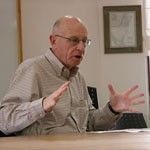
JERUSALEM — Remember the disaster at Mt. Meron? It occurred in May,2021. Forty-five individuals died in a crowd crush and the collapse of the structure. According to newspaper reports, “Planning and safety officials expressed serious concerns over the wellbeing of pilgrims at Lag B’Omer festivities at Mount Meron last year, days before a deadly crush at the event claimed the lives of 45 people. At a meeting on April 22, 2021, former public security minister Amir Ohana pushed police officials to allow more people into the event, even as others expressed concerns over crowding at the site.”
Now the official committee concerned to investigate the disaster has issued “official letters warning of negligence and legal wrongdoing. It placed the blame on former prime minister Benjamin Netanyahu, former public security minister Amir Ohana, Israel Police Insp.-Gen. Kobi Shabtai, former religious services minister Ya’akov Avitan and several other police, government and safety officials.”
One can ask how high the responsibility should go for the disaster. And who among the ultra-Orthodox who urged the event to proceed should be given as much, or more responsibility for what occurred.
Should the prime minister be among those held responsible?
It’s a tough question.
But it combines with indictments against Bibi for fraud, breach of trust, and bribery. Involved are substantial gifts to the then-prime minister and his wife, as well as arrangements between Netanyahu and individuals controlling communications media. Another case, in which Netanyahu is not directly involved, concerns the purchase of submarines manufactured in Germany.
Procedures in all of these cases are far from complete, and may take a long time to reach their conclusion. We’ve heard that it’ll be “years” before we’re done with them.
Meanwhile, Bibi remains the most popular figure in Israeli politics. His party, Likud, is clearly leading others in the polls, and Bibi’s place as Likud’s leader appears to be firm.
What does all this day about Israel’s democracy, and the rule of law? Does it also criticize the very slow process of enforcement and judgment? As well as the long process of committees appointed to investigate serious issues, like the Mt. Meron disaster?
Both the former prime minister and the continuing serving police chief have sneered at the committee investigating Mt. Meron, with the police chief saying that he would continue serving despite the official warning of his culpability.
The issue of crowding was discussed in meetings involving Netanyahu and the public security minister. General rules limited gatherings to 100, but they were relaxed and some 100,000 participated in the fateful event. And while the issue of Corona was prominent in crucial meetings, structural issues and the general problem of crowding were said to be well-known.
Netanyahu has claimed ignorance of the problem, but the public security minister has said “the issue of overcrowding came up as well (as it pertains to coronavirus). We knew there was a real threat.”
The election is scheduled for November 1. There have been lots of polls, and there will be more. Currently it looks like Bibi’s coalition will barely reach, or fall short of the 61 Knesset seats needed to select him as prime minister. The major opponent, the current Prime Minister Yair Lapid, is polling about 54 or 55 seats. And two Arab parties would seem likely to provide him with 61 or more seats. If they support him. But polls suggest low turnout among Israeli Arabs. A continuing opposition to whatever might be described as the Jewish majority? Almost two months remain. Lots of time for promises and commitments. And additional disasters.
We’ll see. (A popular closing for these notes.)
It’s likely to be close. And perhaps unstable. Remember the flakey decisions of several Knesset Members not to continue supporting the Naftali Bennett government. That brought about the collapse of Bennett’s government, and the currently pending national election.